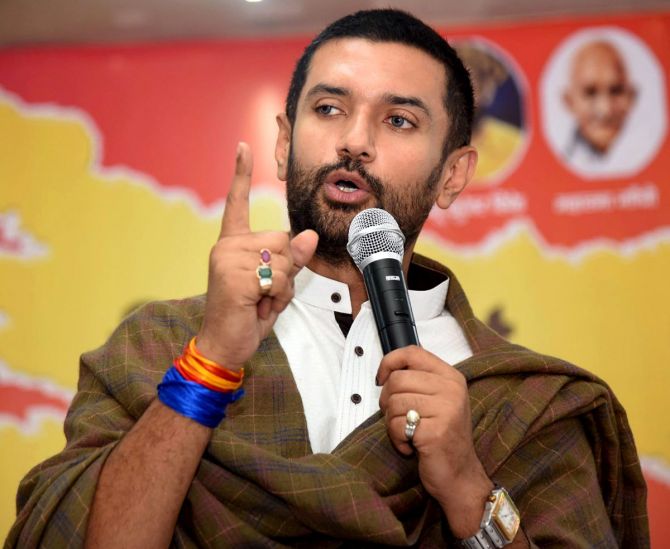Both the BJP and the JD-U abetted the LJP split but interestingly, independently. And there hangs a tale of conflicting interests, gamesmanship, subterfuge, and retribution, reports Radhika Ramaseshan.

On June 13, politics in Bihar experienced seismic waves when the Lok Janshakti Party, a former National Democratic Alliance constituent, split.
Actually, it was more than just a split -- five of the LJP’s six Lok Sabha MPs deserted their leader, Chirag Paswan (the sixth MP), son of party founder Ram Vilas Paswan, one of India’s iconic Dalit leaders who passed away in last October.
The spearhead of the rebellion was Pashupati Nath Paras, Paswan senior’s younger brother who was mentored in politics by Ram Vilas, along with a second sibling Ramchandra Paswan, who died in 2019.
Paras managed to get Prince Raj, MP and Ramchandra Paswan’s son, on his side -- leaving Chirag isolated in the family.
Like other separations in political dynasties, the Paswan clan’s breakup was not an isolated occurrence in Bihar that only impacted Chirag.
Its ramifications touched the major and minor players: the Bharatiya Janata Party, the Janata Dal-United, the Rashtriya Janata Dal, the Congress and the Hindustani Awam Morcha-Secular, and the Vikassheel Insaan Party.
The NDA coalition ruling Bihar comprises the BJP, the JD-U, HAM-S and VIP, while the Opposition is led by the RJD and the Congress.
The perception, backed largely by anecdotes, was the BJP and the JD-U abetted the LJP split but interestingly, independently.
There hangs a tale of conflicting interests, gamesmanship, subterfuge, and retribution.
The LJP had only one MLA after the 2020 assembly elections who joined the JD-U in April 2021, in a forewarning to Chirag that worse was to come.
However, the political calculations behind the mutiny against Chirag worked more in the Lok Sabha.
The BJP has 17 and the JD-U 16 MPs from Bihar.
Both wanted the breakaway LJP faction to merge with them and augment their strength.
That has not happened so far.
A source close to Paras said: “Why would we merge and lose our identity and bargaining power?”
The latter matters critically to Paras right now because he looked at the much-speculated Union government’s Cabinet reshuffle to extract a ministry or two and consolidate his standing within the LJP faction.
“We have to prove to our MPs immediately that the desertions were not in vain,” the source said.
JD-U leader and Bihar Chief Minister Nitish Kumar hoped that a larger group of 21 MPs (16+5) would give him more latitude vis-a-vis the BJP to seek more central berths, something he has not managed so far.
He insisted on a representation in proportion to the number of MPs, which the BJP rejected.
The JD-U does not have a single minister in Prime Minister Narendra Modi’s council of ministers.
“Nitish is already smarting at the JD-U being in the third position in the Bihar assembly, after the RJD and BJP. He’s desperate to outnumber the BJP in the Lok Sabha,” a political source said.
In the 243-member assembly, the JD-U has only 43 legislators, while the RJD has 75 and the BJP 74.
But a personal agenda was equally at play, going back to the assembly polls.
Under Chirag’s stewardship -- and with hindsight, against Paras’s wish -- the LJP quit the NDA and fought solo to “avenge” Nitish.
Chirag’s high-decibel campaign against Nitish -- which Paras kept away from -- yielded one seat to the LJP but damaged the JD-U in 35 to 40 places.
A senior JD-U leader said: “If Chirag was not revengeful, today he would be a central minister and his mother (Reena Paswan), a Rajya Sabha MP. He ruined Ram Vilas Paswan’s legacy. His father learnt his politics from Karpoori Thakur (Bihar’s Socialist icon). Chirag is incapable of even courting arrest.”
That Nitish was unwavering about bolstering his strength was evident in many ways.
Before taking away the LJP’s lone legislator, Raj Kumar Singh, he spirited away the BSP’s MLA Mohammad Jama Khan and then persuaded his former adversary, Upendra Kushwaha to merge his Rashtriya Lok Samata Party with the JD-U.
In this early round, he checkmated the BJP that was surprised when Singh opted for the JD-U and not the BJP, Singh’s parent party until 2020.
JD-U sources claimed that Nitish was working to wean off 10 of the 19 Congress MLAs and even get the five members of the All India Masjlis-e-Ittehadul Muslimeen in the coalition as a foil against the BJP.
However, the BJP believed that it was not outsmarted by Nitish.
Sources claimed the BJP had “nearly” prevailed on Singh to remain an Independent in lieu of getting a ministry but “he changed his mind”.
It also maintained that its central leaders “convinced” Paras to stay independent.
“Had it not been for the BJP, Paras would have integrated his group with the JD-U,” a source said.
For the record, the BJP contended it was a “passive” watcher although multiple sources across Bihar’s political spectrum said that a central BJP functionary and a Bihar BJP leader had accompanied Paras and his MPs during their call on the Lok Sabha Speaker, Om Birla, on June 14, a day after the rebellion.
Paras requested the Speaker to de-recognise Chirag as the LJP’s parliamentary party leader, certify him as new head and treat his group as a separate legislative block. Notification to the effect was issued by the Speaker’s office in three hours.
“It’s a fight between uncle and nephew. We are only concerned that Ram Vilas’ legacy should not go to waste,” a Bihar BJP office-bearer stated.
The real test of who is the inheritor of Ram Vilas’s bequest will await the next elections.
The jury is out.
A Patna-based political observer’s take was: “While Chirag is already working on the sympathy element and portraying Paras as a traitor who stabbed his father, Paras is a grassroots person with organisational skills. It’s emotions versus experience.”











